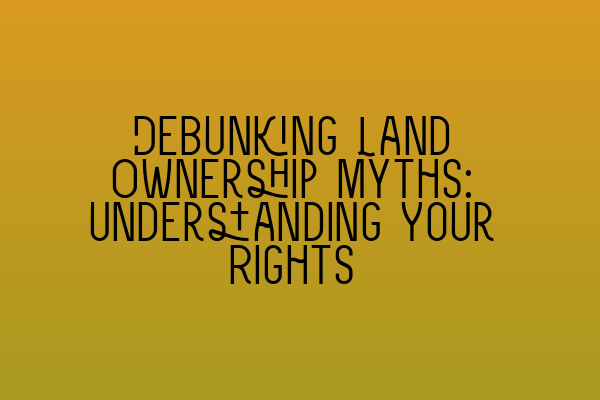Debunking Land Ownership Myths: Understanding Your Rights
As solicitors specializing in property law and land law at SQE Property Law & Land Law, we often come across numerous misconceptions and myths surrounding land ownership. It is crucial for individuals to have a proper understanding of their rights when it comes to owning land, as it can have significant implications for various legal matters.
In this blog post, we aim to debunk some common land ownership myths and provide you with a clear understanding of your rights as a landowner. So, let’s dive in!
Myth #1: Once I own land, I am in complete control of it.
Contrary to popular belief, land ownership does not translate to absolute control over every aspect of your property. There are various laws and regulations in place that govern the use and development of land. These laws may restrict certain activities, such as building structures without obtaining the necessary permits or engaging in activities that may harm the environment.
Understanding these limitations is vital to avoid legal complications and potential disputes with local authorities or neighbors. If you are unsure about any restrictions on your land, it’s advisable to consult a property law expert to help you navigate the legal landscape.
Myth #2: I can do whatever I want with my land.
While it’s true that land ownership grants you certain rights, there are limitations to what you can do with your land. Your property rights may be subject to various legal restrictions, including zoning regulations and local planning policies.
Zoning regulations categorize land into different zones, such as residential, commercial, or industrial, with specific rules and regulations for each zone. These regulations aim to ensure that land use aligns with the intended purpose and benefits the community as a whole. Therefore, if you own residential land, you cannot simply start a commercial business on it without obtaining the necessary permits and approvals.
Understanding the local planning policies and zoning regulations applicable to your land is critical to avoiding legal issues or potential fines. Engaging a qualified solicitor with expertise in land law can provide you with the necessary guidance and help you navigate through these complexities.
Myth #3: Land cannot be taken away from me.
While land ownership provides a sense of security, it is essential to recognize that, in certain circumstances, the government or other entities may have the power to acquire your land, even against your will. This process is commonly known as compulsory purchase or eminent domain.
Compulsory purchase occurs when the government or local authority acquires private land for public purposes, such as infrastructure development or urban regeneration projects. Although the law requires fair compensation to be paid to landowners, it is still important to understand your rights and seek legal advice to ensure that you are adequately compensated for the loss of your land.
Myth #4: Boundary disputes are rare and easily resolved.
Boundary disputes are more common than you might think. Disputes with neighboring landowners over property boundaries, fences, trees, or encroachments can quickly escalate and become complex legal issues.
It is crucial to have a clear understanding of your property boundaries and to consult a solicitor specialized in land law if you suspect any encroachments or boundary-related conflicts. Legal professionals can help you interpret land registry documents, conduct boundary surveys if necessary, and negotiate resolutions with the involved parties.
In conclusion, debunking land ownership myths is essential for anyone looking to protect their rights as a landowner. Understanding the limitations and complexities of land ownership can help you navigate potential legal issues and ensure that you comply with applicable laws and regulations.
If you want to learn more about your legal rights and obligations, we recommend checking out our related articles:
– Understanding Contractual Capacity: Rights and Limitations
– Interactive SQE Mock Tests for Contract Law: Test Your Knowledge
– Join Our SQE Contract Law Webinars: Expert Insights and Guidance
– Contractual Capacity: Understanding Legal Competence in Contracting Parties
– Contract Law Reforms: An Analysis of Recent Changes
At SQE Property Law & Land Law, we are here to provide you with expert guidance and assistance in all aspects of property law and land law. Contact us today to schedule a consultation and ensure that your rights as a landowner are protected.
